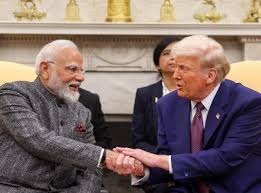‘India has not accepted any mediation, won’t accept it’: PM Modi during call with Trump

India has firmly stated it will not accept any mediation in its internal matters, Prime Minister Narendra Modi said during a recent phone call with then-President Donald Trump. This clear stance highlights India’s commitment to handling its issues independently without external interference.
India’s Firm Stance on Mediation
The conversation reportedly focused on sensitive issues where some suggested international mediation. PM Modi made it clear that India prefers to resolve matters on its own. He stressed India’s sovereign right to manage its affairs without outside intervention.
This position reflects India’s longstanding diplomatic principle of non-interference. It also shows India’s confidence in its governance and legal systems to solve conflicts—whether related to borders, security, or other challenges.
Details of the Modi-Trump Call
The leaders spoke amid rising geopolitical tensions in South Asia and beyond. They discussed bilateral trade, regional security, and India’s recent policy developments.
PM Modi used this opportunity to clarify India’s rejection of mediation offers or suggestions from third parties. Sources close to the matter say Modi was firm: India values its autonomy and will not compromise on sovereign decisions.
India’s Diplomatic Philosophy
India’s refusal to accept mediation is consistent with its diplomatic approach. The country traditionally favors bilateral talks over third-party involvement, especially on matters touching sovereignty.
This strategy helps India protect its interests from potential external pressures. India’s complex political landscape often requires solutions that outside parties may not fully grasp.
Regional and Global Impact
India’s stance may affect regional and global relations. Countries involved in disputes with India will need to seek resolution through direct dialogue, without outside mediators.
Globally, this sends a message that India prioritizes sovereignty and independent policy-making. It supports India’s efforts to assert itself as a responsible, rising power on the world stage.
The United States’ Role
Under President Trump, the U.S. maintained a strategic partnership with India. They cooperated on trade, defense, and regional security. At times, the U.S. encouraged mediation to ease conflicts and promote stability.
However, Modi’s refusal highlights a delicate balance. While the two countries share interests, India insists on protecting its sovereignty even during close cooperation.
Public and Political Reactions in India
Following Modi’s remarks, reactions across India ranged from strong support to cautious approval. Many praised Modi for defending India’s sovereignty and rejecting unwanted external interference.
Opposition parties, though critical of some government policies, generally agreed that mediation in sensitive issues should be avoided. This consensus shows the importance placed on India’s autonomy.
Historical Context
India’s rejection of mediation has deep roots. Past experiences showed outside involvement sometimes complicated solutions. In conflicts with neighbors like Pakistan and China, India preferred direct talks over third-party mediation.
Skepticism toward mediation reflects concerns about impartiality and national interest. India continues to uphold this tradition today.
What Lies Ahead
Modi’s clear message to Trump sets a precedent. India will likely keep rejecting external mediation offers. It will focus on direct negotiations and dialogue to resolve disputes.
This stance will shape India’s relations with international bodies, neighbors, and global powers. It highlights India’s policy of self-reliance in diplomatic matters.
Conclusion
Prime Minister Narendra Modi’s statement during his call with Donald Trump marks a defining moment for India’s diplomacy. It reaffirms India’s commitment to sovereignty and shows confidence in managing challenges independently.
As India navigates complex regional and global dynamics, this firm position sends a strong message: India values its autonomy and expects respect for its sovereignty without outside interference.






